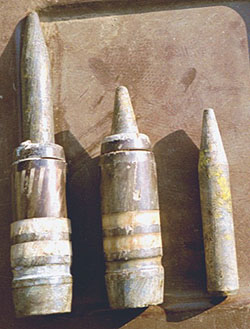SAN JUAN CAPISTRANO, Calif. — Twilight fell over the mountain camp as the group formed a circle to trade war stories: the nightmares of battle that wake them in their sleep. The fighting. The pain. The surgeries. And always, the sudden mood swings.
“Sometimes, we feel like we have to run away,” Alex Cox says.
“The military’s stupid!” Adam Briggs declares.
Alex, 13, and Adam, 12, have never been to war, but are no strangers to the ravages it can inflict. Their fathers were injured in Iraq. Like the 13 other boys and girls ages 7 to 14 at an unusual summer camp this week for children of injured troops, they belong to a generation indelibly marked by war.
Nearly 19,000 U.S. children have had a parent injured in the military since Sept. 11, 2001, the Pentagon says. They are lucky compared with the 2,200 kids whose parents have been killed in Afghanistan or Iraq. But as the U.S. approaches its sixth year at war, the impact of battlefield injuries and frequent deployments on troops’ families — not just the troops themselves — is increasingly clear.
“Wounded service members have wounded family members,” says Michelle Joyner of the National Military Family Association, which runs the camp.
In some ways, the camp in the Cleveland National Forest — which includes 61 other kids whose parents are serving in the war — was like any summer camp: a place for kids to be kids. After arriving Saturday, the campers went swimming, climbed trees, rode horses, sang silly campfire songs and ate parflesnarfs, a gooey concoction of melted chocolate, marshmallows and popcorn.
But at this camp, there were shades of the military lifestyle. Cabin groups were named like military companies: Alpha, Bravo, Charlie. On Monday, the kids went to a beach luau at nearby Camp Pendleton, where Marines let them climb into amphibious landing crafts and handle machine guns.
And each day, there was “quiet time,” a chance to sit and talk about the problems each child is here to escape.
Unlike at school or at home, “kids don’t have to explain themselves,” says Joyner, whose group received permission from the children’s parents for them to speak with a reporter. “They’re with a group of their peers.”
Camper Savannah Jacobs, 11, came to camp from the Marine base at Twentynine Palms, Calif. She says she is “sad” that her stepfather, Marine Sgt. Jose Ramirez, hasn’t been able to ride a bicycle with her and her sister, Sierra, 9, since he was injured in a helicopter crash in Iraq last December.
However, Savannah says, talking with other campers about “stuff that happened to their dad makes me feel like I’m not alone, and the only one who’s suffering.”
Such sentiments come pouring out again and again: the war, through the eyes of children.
To a young child whose father loses an arm in combat, that means no more playing catch or tummy tickling, says Kent Deutsch, a Marine veteran who is a family therapist and one of three counselors at the camp. Deutsch says that when parents return from war injured or having “seen and done things that go against their inner being, the child gets a parent back who wasn’t the parent who went away.”
At a time when the Pentagon says as many as one in five returning service members suffers from post-traumatic stress disorder or other psychological problems, many of their children are struggling to grasp what happened to make their parent so different.
“What about the traumatic brain injury, where before, Daddy was really smart but now the 12-year-old has more intellectual functioning than Dad?” says Kuuipo Ordway, a mental health therapist who works with military kids here. “How do you adjust to that? What’s the long-term effect on a child?”
Children of service members who have lost limbs, spent months in rehab and undergone repeated surgeries are prone to depression and feelings of being overwhelmed, Ordway says. “They’ve become caretakers. Before, they were the ones being taken care of.”
Camper Chessa Lara, 14, says she “wasn’t a nurse — technically” for her father, “but I was always there to make sure he was OK.”
Army 1st Sgt. Peter Lara was shot in the jaw and shoulder in Iraq in 2005 and has undergone “a lot” of surgeries since then, Chessa says. He also suffers from PTSD.
Chessa, her sister Tauntiana, 13, and brother Julien, 11, arrived at camp in an RV with their parents and five dogs after a two-week drive from Fairbanks, Alaska. When camp ends, they’ll move on — like so many other military families do each summer — to their next deployment, at Fort Jackson, S.C.
The constant moves have been hard on the family, but the children say their father’s injury may have been harder.
“Sometimes when he’s in pain, he cries and stuff,” Julien says through watery eyes.
Chessa says her father sobs for a buddy who died in the firefight in which he was wounded.
“I wasn’t used to seeing him cry because he’s a man. He always said dads shouldn’t cry,” says Chessa, struggling to hold back tears.
Still, she sees a silver lining.
“Now that he got injured, he says since God gave him a second chance, he wants to spend more time with us. He says he doesn’t want to lose us,” Chessa says, adding that her father’s ordeal has made her “more responsible.”
Program may expand next year
The camp is a pilot program that is part of the NMFA’s network of camps for military kids. The group hopes to expand it next summer. Dubbed Operation Purple, the camps will host nearly 4,000 children of service members at 34 sites in 26 states this summer. Camp is free, supported by private groups, including the Sierra Club and the Michael & Susan Dell Foundation.
Little research has been done on kids of injured troops, Ordway says, adding that “we’ve got to figure out their needs.”
Many military children have “anger issues” and stress over being separated from their parents, says camp director Gene Joiner, who has run Operation Purple camps in North Carolina since the program began in 2004. But the ones whose parents were hurt have additional pressures.
“The ‘wounded children,’ you can tell there’s something more,” Joiner says. “There’s a gap with these kids on how to relate to each other. They stand off a little bit more.”
Jennifer Allman of Spring Valley, Calif., says she has seen that in her children since their father, Army Staff Sgt. Corby Allman, suffered back injuries, partial vision and hearing loss and PTSD after his convoy was hit by an improvised explosive device in Iraq in 2004.
Brandon Allman, 12, is “distant,” his mother says. Jacquelyn, 10, is angry and blames herself for her father’s disability. At 7, Cheyanne appears, at least for now, just happy to have her daddy home.
“It’s hard because they don’t understand why he gets upset really quick with them or why he can literally forget a whole conversation in two minutes,” Jennifer Allman says. “I wanted them to come to camp to be with other military kids, to get counseling and to know that they are not alone.”
Brandon says his father’s injuries mean “he has to relax all the time” and can’t go out to play. Brandon says he now fixes his sisters’ bicycles and reads the numbers off a credit card when his father uses it to buy things by phone, because his dad no longer can see the numbers.
Jacquelyn, who like Cheyanne came to camp with pink streaks in her hair, says their dad “gets stressed out more and gets headaches.” She says when her brother gets frustrated with his father’s condition, he yells a lot and sometimes locks himself in his room.
“There’s usually a lot of crying by family members.”
Children mimic parents
Patients with PTSD tend to be “hyper-vigilant, irritable and always looking for danger,” Ordway says. She says initial studies of their children show that many “model” their behavior after their parent’s and become more anxious, more depressed and less able to sleep. That can lead to shorter attention spans and behavior problems.
For some veterans who saw Iraqi or Afghan children die, it often is difficult to come home and face their young relatives.
“When he came back, he didn’t seem right,” camper Andrew Steinhoff, 12, says of his brother, Army Spc. Ryan Hice, 19, who returned to Fayetteville, N.C., from Afghanistan in April suffering from seizures that his mother, Therese, says are caused by anxiety.
“His attitude changed a lot,” Andrew says. “His whole personality is just different.”
Most painful of all, Andrew says, the big brother with whom he used to hang out now can be reluctant to be with him.
Andrew says their mother told him that “there was this kid who reminded [Ryan] of me, who died” in Afghanistan. Now, when Andrew tries to talk to Ryan, “He says, ‘Not right now, Bug,’” says Andrew, using his brother’s nickname for him.
In an interview, Ryan Hice says he has been diagnosed with PTSD, traumatic brain injury and seizures caused by anxiety. He says little about his time in Afghanistan but does allow that “they say you have a twin everywhere. Well, my brother had one over there.” Hice says that when he first returned home, “I wasn’t even able to look at my brother because of stuff that happened over in Afghanistan. ... It’s a work in progress. I’m now able to be in the same room with him, so that’s a beginning.”
Hice adds that “I know it’s been hard” on his little brother. He hopes Andrew made friends at camp and that “maybe they can somewhat explain to him not to take it personal.”
Therese Steinhoff says her younger son has become withdrawn and feels guilty.
“He thought he did something wrong, and he didn’t,” she says. She sent Andrew to camp because “he needs to be around others who are affected by this war.”
Every kid at the camp has a military connection, but “the wounded kids don’t want to talk about the military that much,” says Katherine Joiner, 18, a counselor here.
Ordway says that as more camps for children of injured service members are opened, they are likely to emphasize small group discussions to encourage kids to express their feelings.
At this camp, Alex Cox didn’t need much encouragement to speak his mind.
One of five children of Navy hospital corpsman Robert Cox from nearby Oceanside — Alex’s sister Holly, 11, and brother Nick, 14, also came to camp — Alex talked angrily about his dad’s seven deployments and problems since his shoulder was torn up in a mortar attack in Iraq in 2004.
When Ordway asked what the children would want to tell their parents, Alex yelled, “Get over it, man!”
Alex’s mother, Monica, herself a Navy veteran, says her children have suffered from “bad grades to stomach issues to anxiety and depression” because of their father’s deployments and injury.
She says Holly has become “clingy,” and Alex was suspended from school for hitting another student. Their father says Alex and Nick argue all the time.
“I’ve seen my share” of combat, says Robert Cox. But when it comes to his children, “It just tears you up. It’s a tough deal for them.”
By Andrea Stone - USA Today
Posted : Thursday Jun 21, 2007
article at
Army Times



 A special investigation on the effects of depleted uranium reveals the Army made a tape warning of the effects of depleted uranium which was never shown to troops despite the fact the Pentagon knew the agent to be potentially deadly, CNN reports Tuesday.
A special investigation on the effects of depleted uranium reveals the Army made a tape warning of the effects of depleted uranium which was never shown to troops despite the fact the Pentagon knew the agent to be potentially deadly, CNN reports Tuesday. 





